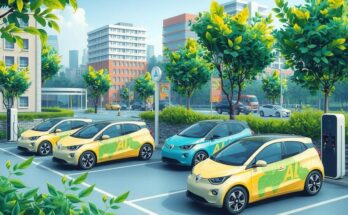Rwanda has launched a Rwf 1.2 billion carbon market initiative to promote electric vehicle adoption, supported by the Global Green Growth Institute. This project aims to develop carbon reduction strategies across numerous sectors while fostering private investment in a carbon-neutral economy. By 2030, the country aims to secure $900 million for EV infrastructure, with partnerships enhancing capacity-building efforts. The National Carbon Market Framework was unveiled at COP28 to guide carbon credit trading and promote sustainable development effectively.
Rwanda’s government has launched a significant initiative aimed at operationalizing a carbon market, with an investment of Rwf 1.2 billion. This endeavor seeks to enhance awareness and capacity among public and private stakeholders, thereby promoting the adoption of electric vehicles (EVs). The project, titled Rwanda Article 6 Readiness and Carbon Market Framework Operationalisation, will be funded by the Global Green Growth Institute and executed in partnership with the Rwanda Environment Management Authority over a two-year period.
The carbon market initiative is designed to provide essential technical support for developing high-quality carbon reduction projects across various sectors, including agriculture, forestry, energy, transport, and waste management. The Rwanda Environment Management Authority has pointed out that renewable energy projects, particularly the expansion of electric vehicles, hold considerable promise within the carbon market framework.
A carbon market allows for the trade of carbon credits, which represent one tonne of reduced carbon emissions, enabling businesses to offset their emissions by investing in projects that reduce greenhouse gases. The adoption of electric vehicles in Rwanda requires an estimated financing of up to $900 million by 2030. This financial framework aims to stimulate private sector engagement and the establishment of a carbon-neutral economy as EVs serve as a sustainable alternative to fossil fuel-powered vehicles.
Srinivas Cheruvu, Managing Director of CFAO Mobility Rwanda, emphasized the potential of electric vehicles to draw investments from the carbon market, especially for corporate fleets due to their efficacy in emissions reduction. For example, the BYD Dolphin electric car showcases remarkable efficiency, able to cover the distance between Kigali and Rubavu with significantly lower charging costs compared to fuel expenses.
In terms of incentives, the tax exemption for electric vehicles is viewed as a catalyst for increasing EV adoption in Rwanda. Despite this positive outlook, issues such as long charging times due to a lack of public fast-charging stations continue to pose challenges for users. Teddy Mugabo, CEO of the Rwanda Green Fund, revealed that the fund is supporting the expansion of EV infrastructure to address these issues.
Additionally, partnerships with countries like Singapore and Sweden are pivotal for enhancing the technical know-how and project design necessary for successful renewable energy projects. These collaborations aim to mobilize climate finance for initiatives that align with Rwanda’s carbon market strategy.
At the recent COP28 in Dubai, Rwanda introduced its National Carbon Market Framework, establishing guidelines for carbon credit trading while emphasizing the need for transparent and functional market systems. Although challenges such as awareness gaps exist, the Rwanda Environment Management Authority continues to work towards inviting international investments and promoting sustainable development. Caroline Raes, GGGI Country Representative in Rwanda, highlighted the critical need for equitable participation in carbon markets to unlock significant financial resources and catalyze climate action.
In conclusion, Rwanda’s substantial investment in establishing a carbon market is seen as a vital step toward fostering electric vehicle adoption and enhancing sustainable practices. This initiative not only addresses the demand for reducing carbon emissions but also opens new avenues for private investment and partnerships aimed at achieving climate goals. By creating a favorable environment for electric vehicles, Rwanda is positioning itself as a leader in green growth and climate action, despite the operational challenges that remain.
Original Source: www.newtimes.co.rw




